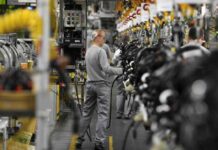Trump-Steuerreform: Haushalt und Repräsentantenhaus in Deutschland
In den USA hat das von den Republikanern kontrollierte Repräsentantenhaus die Steuersenkungs- und Grenzpläne von Präsident Donald Trump gebilligt, um seiner Agenda für 2025 einen Schub zu geben. Die Haushaltsvorlage soll die Grundlage für Abschiebungen, Militärausgaben, Förderung der Energiegewinnung und niedrigere Steuern bilden. Die Abstimmungen waren nur der erste Schritt zum neuen Haushalt, der letztendlich auch vom Senat angenommen werden muss. Das Ergebnis der Abstimmung am späten Dienstag (Ortszeit) fiel knapp aus, mit 217 Ja- zu 215 Nein-Stimmen. Ein republikanischer Abgeordneter stimmte dagegen, kein Demokrat unterstützte die Maßnahme, und ein Demokrat gab seine Stimme nicht ab. Die Republikaner verfügen in der Kongresskammer über eine Mehrheit von 218 von 215 Stimmen.
Noch wenige Stunden vor der geplanten ersten, prozeduralen Abstimmung war nicht klar, ob „Speaker“ Mike Johnson seine Parteikollegen hinter sich hatte. Es folgte eine Reihe ungewöhnlicher Manöver, bei denen der Präsident des Repräsentantenhauses eine Abstimmung über den Gesetzentwurf annullierte – offenbar, weil die Stimmen für eine Verabschiedung fehlten – und die Abgeordneten informierte, dass es in der Nacht keine weiteren Abstimmungen geben würde. Dann änderte Johnson seinen Kurs doch noch.
Die Wende kam, nachdem Johnson und sein republikanischer Stellvertreter Steve Scalise stundenlang versucht hatten, die Kritiker zu überzeugen. Beide Politiker sagten, Trump selbst habe ebenfalls mit zögernden Mitgliedern Kontakt aufgenommen, um sie auf die Notwendigkeit hinzuweisen, den 4,5 Billionen Dollar schweren Plan zur Steuersenkung voranzutreiben. Mit dem Plan sollen auch die Abschiebung illegal in den USA lebender Migranten, eine verstärkte Grenzsicherung, die Deregulierung des Energiesektors und höhere Militärausgaben finanziert werden.
Einige der Abgeordneten forderten weitergehende Kürzungen am Bundeshaushalt. Bislang ist geplant, zur Finanzierung von Trumps Agenda zwei Billionen Dollar über zehn Jahre einzusparen. Das Volumen des diskutierten Haushaltsentwurfs liegt bei 4,5 Billionen Dollar. Der Bund hat in den USA gegenwärtig Schulden von mehr als 36 Billionen Dollar, der Plan der Republikaner würde eine Erhöhung um vier Billionen Dollar ermöglichen.
„Wenn der republikanische Haushalt verabschiedet wird, wird das Defizit schlimmer und nicht besser“, hatte der republikanische Abgeordnete Thomas Massie aus Kentucky am Montagabend auf X erklärt. Mindestens zwei seiner Kollegen forderten ebenfalls tiefere Einschnitte. Bedenken kamen auch von republikanischen Abgeordneten aus Wahlbezirken mit knappen Mehrheiten und einem großen Anteil an Hispanics. Dort wird befürchtet, dass die Einschnitte Lebensmittelhilfen, Stipendien und Krankenversicherungen beeinträchtigen könnten.
Der Kongress steht unter Zeitdruck, denn die Finanzierung der Bundesbehörden läuft am 14. März aus. Im Laufe des Jahres müsste zudem die Schuldengrenze des Bundes angehoben werden, um eine Zahlungsunfähigkeit zu vermeiden. Auch im Senat haben die Republikaner nur eine kleine Mehrheit, sodass sie ein besonderes Verfahren anwenden müssen, um eine Sperrminorität der Demokraten zu verhindern. Der Senat verabschiedete vergangene Woche bereits eine eigene, einfachere Version des Haushalts: Ein Paket mit einem Volumen von 340 Milliarden Dollar, das Trumps Prioritäten für Grenzen, Verteidigung und Energie abdeckt. Die kontroversen Steuerfragen sollen dabei erst im Laufe des Jahres angegangen werden.









